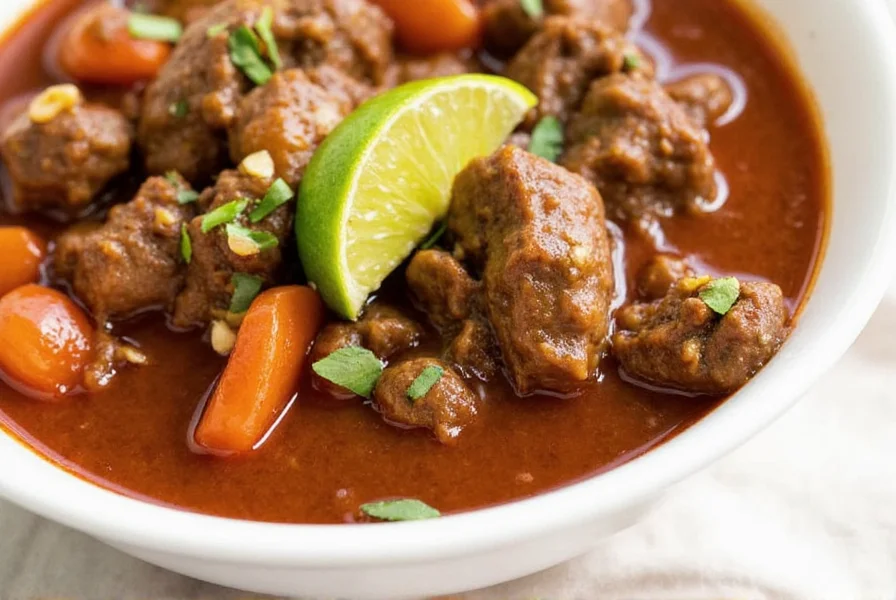Table of Contents
Authentic Mole de Pollo Recipe
Mole de pollo is a rich, complex Mexican sauce traditionally served with chicken. This authentic recipe delivers perfect balance of sweet, spicy, and earthy flavors with step-by-step guidance for home cooks. Follow these detailed instructions to create restaurant-quality mole at home.
Ingredients
| Ingredient | Quantity | Notes |
|---|---|---|
| Dried Ancho Chiles | 3-4 pieces | Remove stems and seeds |
| Dried Mulato Chiles | 2-3 pieces | For deeper flavor |
| Dried Pasilla Chiles | 1-2 pieces | Adjust for heat preference |
| Almonds | 1/4 cup | Raw, lightly toasted |
| Peanuts | 1/4 cup | Unsalted |
| Sesame Seeds | 1/4 cup | Raw |
| Cacao Powder | 2 tbsp | Unsweetened |
| Dark Chocolate (70% cacao) | 1 oz | Chopped |
| Cinnamon | 1/2 tsp | Ground |
| Cloves | 1/4 tsp | Ground |
| Cumin | 1 tsp | Ground |
| Dried Oregano | 1 tsp | |
| Garlic | 2 cloves | Minced |
| Onion | 1 medium | Chopped |
| Chicken Broth | 1 cup | Low-sodium |
| Olive Oil | 2 tbsp | |
| Water | 1/2 cup | |
| Sugar | 1-2 tsp | Optional for balance |
| Whole Chicken | 3-4 lbs | Cut into pieces |
| Salt | To taste |

Step-by-Step Instructions
- Toast chiles: Place dried chiles in a dry skillet over medium heat for 1-2 minutes per side until fragrant (do not burn). Remove stems and seeds. Soak in hot water for 20 minutes.
- Toast nuts/seeds: In the same skillet, toast almonds, peanuts, and sesame seeds until golden. Set aside.
- Blend sauce: In a blender, combine soaked chiles (with water), toasted nuts/seeds, cacao powder, cinnamon, cloves, cumin, oregano, garlic, onion, chicken broth, olive oil, and water. Blend until smooth.
- Cook sauce: Pour mixture into a saucepan and simmer over medium heat for 20-30 minutes, stirring occasionally.
- Add chocolate/sweetener: Stir in chopped chocolate and sugar (if using). Simmer 10 more minutes until thickened. Season with salt to taste.
- Cook chicken: Simmer chicken pieces in water for 20-25 minutes until cooked through. Remove chicken and set aside.
- Combine: Pour mole sauce over chicken and simmer together for 10 minutes. Serve immediately.
What is the difference between mole and mole de pollo?
Mole refers to a broad category of complex Mexican sauces containing chiles, spices, nuts, and chocolate. "Mole de pollo" specifically means "mole with chicken" - it's mole sauce served with chicken. All mole de pollo contains mole, but not all mole is served with chicken (some versions use turkey, eggs, or as a dip).
How long does mole de pollo last in the refrigerator?
Properly stored in an airtight container, mole de pollo will last 4-5 days in the refrigerator. Flavors improve after the first day. For longer storage, freeze for up to 3 months.
Can I make mole de pollo without chocolate?
Yes, but it significantly changes the flavor profile. Substitute with 1/4 cup mashed ripe plantain or extra nuts for sweetness. Note: Traditional mole relies on chocolate for depth, so the result will be less complex.
What chicken cut works best?
Thighs and drumsticks are ideal due to higher fat content. Bone-in, skin-on pieces add more flavor than boneless. If using breast meat, avoid overcooking to prevent dryness.
Why is my mole too bitter?
Add 1-2 tsp sugar or honey to balance bitterness. Ensure chiles were properly toasted (not burned) and use high-quality chocolate (70% cacao or higher). Simmering longer also mellows bitterness.
Conclusion
This authentic mole de pollo recipe delivers perfect balance of sweet, spicy, and earthy flavors. With proper ingredient selection and careful cooking, you'll create a sauce that elevates any meal. Remember: mole improves with time - let it rest 1 hour before serving for maximum flavor development. Enjoy the rich heritage of Mexican cuisine in your own kitchen!










 浙公网安备
33010002000092号
浙公网安备
33010002000092号 浙B2-20120091-4
浙B2-20120091-4